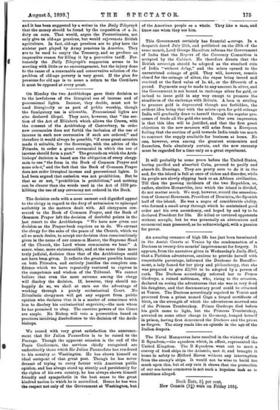The decision ends with a most earnest and dignified appeal
to the cldrgy in regard to the duty of submission to episcopal authority in the matters dealt with. All clergymen con- sented to the Book of Common Prayer, and the Book of Gammon Prayer left the decision of doubtful points in the last resort to the Archbishops. " We have now given our decision as the Prayer-book requires us to do. We entreat the clergy for the sake of the peace of the Church, which we all so much desire, to accept our decision thus conscientiously given in the name of our common Master, the Supreme Head of the Church, the Lord whose commission we bear." A saner, wiser, more statesmanlike, and at the same time more truly judicial, decision than that of the Archbishops could not have been given. It reflects the greatest possible honour on both Primates, and entirely justifies the complete con- fidence which we have repeatedly ventured to express in the competenCe and wisdom of the Tribunal. We cannot believe that even the most extreme among the clergy will disobey the decision. If) however, they should un- happily do so, we shall at once see the advantage of working through a pnrely ecclesiastical Court. No Ritualistic clergyman will get any support from public opinion who declares that it is a matter of conscience with him to disobey his ecclesiastical superich-s;—the men whom he has promised to obey. The coercive powers of the Court are ample. No Bishop will veto a prosecution based on praCtides involving disobedience to the decision of the Arch- bishops.


































 Previous page
Previous page